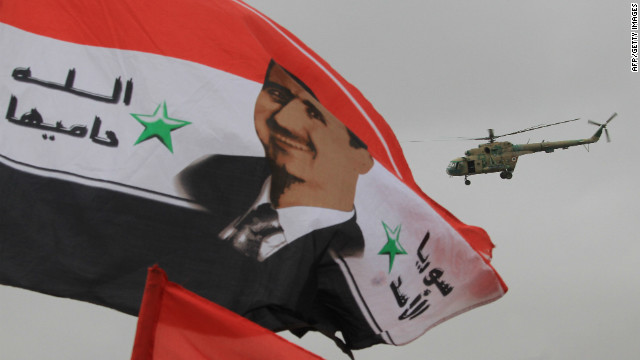
- At least nine people are killed Saturday across Syria, opposition activists say
- A U.S. official slams Syrian President Bashar al-Assad after the Tremseh massacre
- The Syrian government blames the Tremseh incident on armed terrorist groups
- At least 80 people are killed Friday, opposition group says
Are you in Tremseh in Hama province? Send photos and stories to CNN iReport.
(CNN) -- Still grappling with a gruesome massacre that has outraged world leaders, Syrians endured yet another bloody day Saturday when regime forces launched attacks from low-flying helicopters, opposition activists said.
At least nine people were killed in Saturday morning violence, including seven in Douma, the opposition Local Coordination Committees of Syria said.
Farther south, the Daraa province town of Khirbet Ghazaleh came under heavy shelling and machine gun fire after the Syrian army surrounded it with tanks, the LCC said.
"Helicopters fly over the city at a low altitude with a continued siege of the city and gunfire from snipers," the opposition network said.
The reports of relentless violence come two days after Syrians endured what may be the single deadliest day in the 16-month crisis.
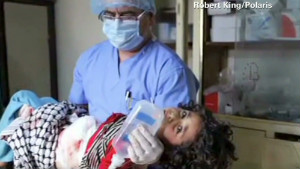 Witness to slaughter in Syria
Witness to slaughter in Syria 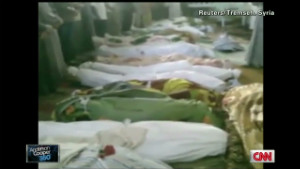 Syrian activist: Hundreds are dying
Syrian activist: Hundreds are dying  'Syria has become a schizophrenic place'
'Syria has become a schizophrenic place' 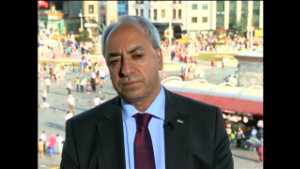 'Massacres in Syria send terror message'
'Massacres in Syria send terror message' 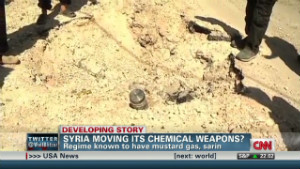 Syria's chemical weapons
Syria's chemical weapons 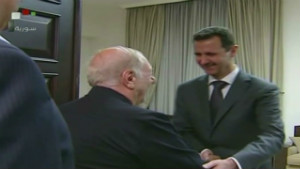 U.N. sets deadline for Syria
U.N. sets deadline for Syria More than 200 villagers were killed in the Hama-area town of Tremseh on Thursday, the LCC said, and dozens more were killed elsewhere across the country.
International anger against Syrian President Bashar al-Assad has ratcheted up since the Tremseh incident, with at least one U.S. official suggesting the need for more pressure on al-Assad's regime.
"Through these repeated acts of violence against the Syrian people, President Assad has lost legitimacy to lead. It is time for him to go. It is time for the political transition that is long overdue to finally get underway," Josh Earnest, a White House spokesman, told reporters Friday.
"It certainly does build strong international support ... to continue to ramp up the pressure on Assad," he added, citing "ongoing conversations at the United Nations about additional ways that we can build some international agreement and raise the stakes even further."
Another 80 people were killed Friday, according to the LCC.
The dead include seven members of the same family who were killed when a mortar fell on their home in the city of Douma, near Damascus, opposition activists said. Activists posted an amateur video that purports to show their bodies covered with blankets and sheets while a man in mourning calls for revenge against al-Assad.
CNN cannot independently verify reports from Syria because the nation has restricted access by international journalists.
Activists in the city of Hama, meanwhile, gave a grisly account of the assault in Tremseh.
Witnesses inside the town told the activists by telephone that Syrian military forces had launched a full-scale attack against the opposition Free Syrian Army inside the town, which was surrounded by government tanks and artillery.
As the government forces rained artillery rounds into the town, a number of village residents fled their houses, going into the streets, where many of them were shot dead by the government militias, the activists told CNN.
The government painted a starkly different picture of Tremseh than that detailed by opposition groups.
The state-run Syrian Arab News Agency blamed "armed terrorist groups" for the violence. It said the government said residents called security forces for help after the terrorist groups raided the neighborhood.
Regime forces arrested some of the members of the terrorist groups and confiscated their weapons, the government said.
"Armed forces successfully dealt with the terrorists without casualties taking place among the citizens. They searched into the terrorists' dens where they found the dead bodies of a number of citizens who had been abducted and killed by the terrorist groups," SANA reported, citing a military source.
Meanwhile, many who survive the violence are caught in a precarious humanitarian situation.
The chief U.N. organization that coordinates emergency aid warned Friday that more Syrians will die if contributing nations do not follow through and fund its relief operation.
"We have run out of language to describe how it is for the civilian population," said John Ging, operations director and chairman of the Syria Humanitarian Forum for the U.N. Office for the Coordination of Humanitarian Affairs. "It is physical and it is psychological."
Humanitarian agencies in Syria are facing "an incredibly complex and dangerous situation to develop networks to be able to deliver to the areas that have been affected by the conflict," he said.
Though lack of security has prevented the agencies from reaching all those in need, progress has been made, he said. For example, food assistance reached 200,000 people in April; that number was expected to more than quadruple this month, he said.
CNN's Saad Abedine, Dan Lothian, Hamdi Alkhshali and Holly Yan contributed to this report.


